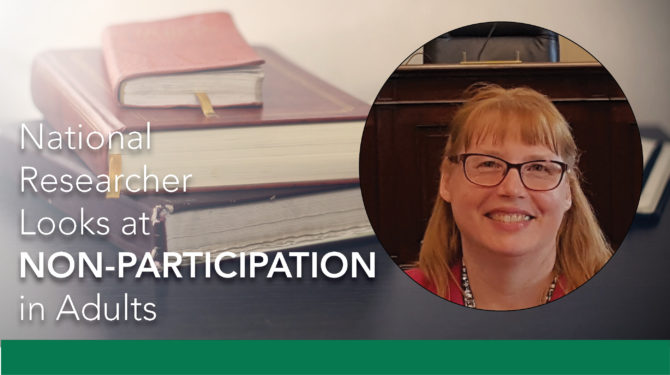National Researcher Margaret Patterson Studies Adult Non-Participation: The Forgotten 90%

How do you count someone who doesn’t walk into the room?
You find where they are walking.
That is just what Dr. Margaret Patterson and her team did for a recent study on adult education participation. An independent researcher and past research director of the American Council on Education, Dr. Patterson has researched adult literacy and learning for the past fifteen years, publishing numerous articles on the trends, demographics, and transitions of adult learners.
Along her research path, she uncovered this stark fact: only 10% of adults who need basic skills participate in the adult education system in the US. So what happens to the other 90%?
Patterson’s CAPE study – Critiquing Adult Participation in Education: Deterrents and Solutions – answers this question. For this report, the first of three, Patterson and her research team visited Florida, Kansas, Louisiana, Virginia, and Ohio, conducting 25 interviews with 125 adults who are not currently participating in adult education. Ninety-four of those interviewed had never attended any adult education classes.
“One of the most important aspects of this study is the methodology we used,” states Patterson. “It’s easy for us to assume why someone didn’t participate in a class, but the best way to answer the questions about the Forgotten 90% is to ask them. They are the subject experts on their own lives and motivations. However, it can be challenging to find people who choose not to do something.”
That’s where Seeds of Literacy was able to help. Bob McFeeley, Seeds Outreach Coordinator, worked closely with Dr. Patterson and her team to organize interviews with adults in the Cleveland area. He called on a number of Seeds’ partner nonprofit organizations and together, found adults interested in offering their experiences and opinions about why they choose not to participate in adult education.
These deterrents are part of the study’s findings, and are ranked in situational, dispositional, and institutional categories:
Situational
- Lack of transportation
- Taking care of family members (young and old)
- Lack of money
Dispositional
- Past experiences with education
- Physical and mental health concerns
- Little or no free time due to family care and multiple jobs
Institutional
- Program rules and schedules
- Confusing policies and rules
- Lack of awareness of programs
But research didn’t stop with the weight of deterrents. Instead, Patterson asked for interviewees to problem-solve how to change existing systems, “or, as one adult put it eloquently, creating alternative systems and alternative classes for alternative people.”
Proposed changes included:
Situational
- Eligibility for bus passes, carpooling, used car programs through churches and employers
- Peer support groups and affordable childcare options
- Scholarships or sponsorships for adult education, reduced HSE test costs
Dispositional
- Self-encouragement and motivation; support groups and therapy
- Maintaining physical and mental health through free and low cost services
- Requesting time flexibility for assignments
Institutional
- Community input on adult education locations
- Variety of class times and sessions
- Tutoring, small groups, and one-to-one instruction
- In-house childcare
“Deterrents – and solutions – don’t exist in a vacuum,” comments Patterson. “They are components of and intertwined with complex social, political, and economic root causes that adults face daily: poverty, family dysfunction, social identity, missing infrastructure, and crimes and violence. Still, adults recommended a wealth of actionable solutions, which we included in this report to honor those adults’ efforts and contributions.”
Since her visit to Cleveland, Dr. Patterson has taken this first report to a Congressional briefing in Washington DC. “I was honored to present our findings, and delighted to quote one of the adults from Cleveland,” remarks Patterson. “Their thoughts really wowed policymakers.”
And we’re really wowed that the Forgotten 90% are now less forgotten.
# # #
J. Steigerwald
To read the full report, click here.
Dr. Patterson’s other reports for the CAPE project are available:
The CAPE project was sponsored by VALUEUSA, the only national organization governed and operated by current and former adult learners who work to improve our nation’s education system and empower adults with low literacy skills to realize their human potential, and funded with generous support from the Dollar General Literacy Foundation.
